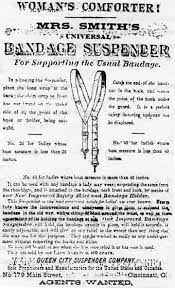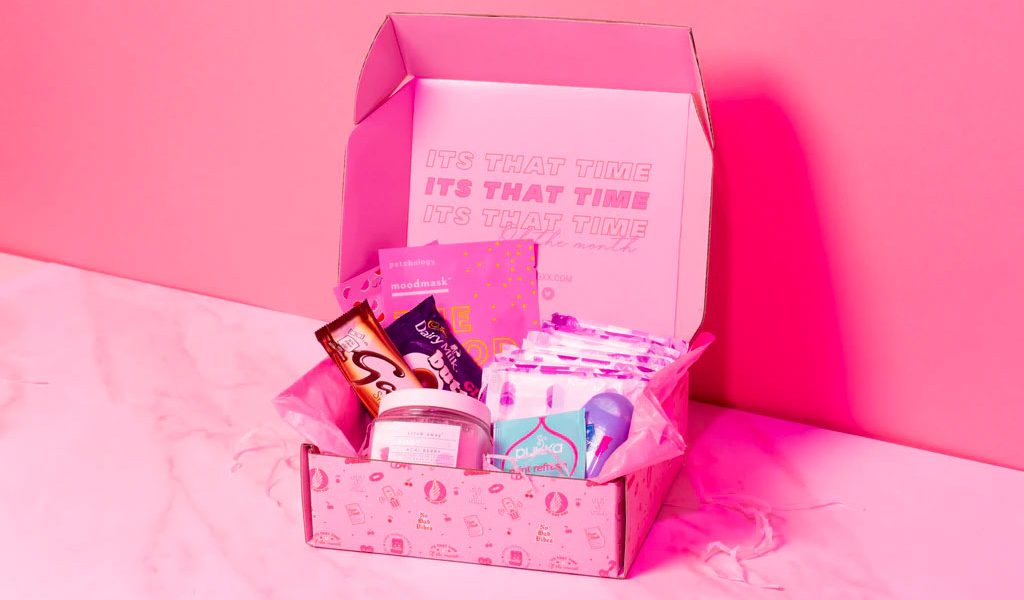There are many theories as to why periods became taboo. Freud argued that it was our fear of blood that made periods a conversational no-go, whilst more modern anthropologists blame the deep, all-powerful roots of the patriarchy for its ability to shame. Whatever the origin, it has affected the way brands have evolved to sell feminine products, and connect with those who buy them, for centuries.

Beginning in the 1870s with the promotion of Mrs.Smith’s bandage suspenders, menstruation had made it to market. Research suggests that, like other fictitious characters, Mrs.Smith was born out of the early commodification of periods. While women at the time could own (or at least co-own) some businesses, the likelihood of Mrs.Smith being Betty Crocker’s bloody cousin – and not a real woman – is pretty high.
Using invented characters to sell products is a tried-and-tested ploy. Brands aim to relate to the specific audience(s) they hope will buy into their product. If Betty had been a Brian at it’s time of creation during the interwar period, it wouldn’t have taken off – because it didn’t reflect the audience’s reality. In the same way, if Mr.Smith had sold women a bandage suspender, it would erupt feelings of embarrassment at a time when being appealing to men was vital.
The early 1900s brought us lines such as “Silent Purchase: A Modess Advantage”. With the introduction of new brands, competition validated the need for menstrual products – but only within the feminine sphere. In fact, the actual word ‘period’ wasn’t used in TV advertising until 1985, when we had finally gotten over how terrifying it must be for men to hear about it. Unfortunately, this still seems to be something we must campaign against, as shown below by Always UK.
However, it’s our current forms of branding that are probably the most sinister – and a prime example of menstrual capitalism: marketing period products by means of feminist messaging in an attempt to create a ‘halo effect’ for companies that are commercial enterprises at their core. In other words, women are drawn in by the promise that their purchase is forward-thinking, empowering and beneficial, when in reality it’s masked capitalism at work.
Subscription boxes are a prime example of menstrual capitalism in action: consumers pay a fee to have menstrual hygiene products (as well as candles, snacks etc.) delivered to them. Match this with a more general, feminism-based incentive (i.e. ‘Happy IWD! Get 20% off for being a #BossBabe”) and you’ve got us women hooked, lined and sinkered.
It shouldn’t be debated that brands must be celebrating women, but calling into question their sincerity should be (and is) a concern for both sellers and consumers. With young people more suspicious of brand transparency than ever before, it’s no longer acceptable to use feminism as a marketing goldmine. In fact, it’s insulting.
Instead, for brands like Hey Girl, a ‘buy one, donate one’ UK-based company, feminism is at it’s core. Not only is receiving synonymous to giving back, but it uses feminism to provide for those who need it, in a way that is neither sexualising nor a tiptoe around the process they’re meant to solve. By incorporating feminism, not as a tagline but as a mindset – as a tool that genuinely empowers, rather than dilutes a very real problem – brands will not only win over consumers, but set standards for their respective industries. Such standards, we hope, will one day lead to a more accessible, inclusive industry – suitable for every individual who has a period.
While profits may be a business’ aim, it will only be through a strategy rooted in authenticity that companies will garner loyalty and respect from their consumers. Feminism is a hard-fought fight, and menstrual capitalism needs to stop, period.
If you’re interested in knowing more about this topic, feel free to check out these posts in The Drum and The Cut. I’d also recommend checking out this Holland&Barrett ad, which aims to help support women during menopause.
By Millie Dunne



